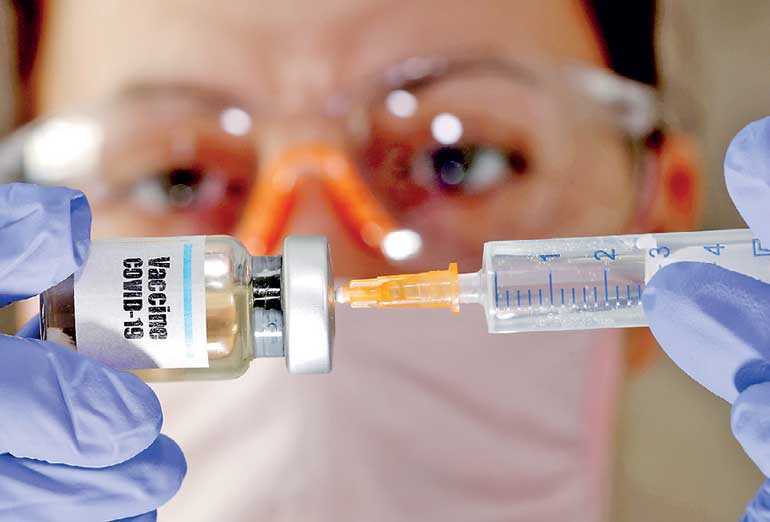Thursday Feb 26, 2026
Thursday Feb 26, 2026
Tuesday, 27 October 2020 02:10 - - {{hitsCtrl.values.hits}}

woman holds a small bottle labeled with a “Vaccine COVID-19” sticker and a medical syringe - REUTERS/File Photo
LONDON (Reuters): One of the world’s leading COVID-19 experimental vaccines produces an immune response in both young and old adults, raising hopes of a path out of the gloom and economic destruction wrought by the novel coronavirus.
The vaccine, developed by the University of Oxford, also triggers lower adverse responses among the elderly, British drug maker AstraZeneca Plc, which is helping manufacture the vaccine, said on Monday.
A vaccine that works is seen as a game-changer in the battle against the novel coronavirus, which has killed more than 1.15 million people, shuttered swathes of the global economy and turned normal life upside down for billions of people.
“It is encouraging to see immunogenicity responses were similar between older and younger adults and that reactogenicity was lower in older adults, where the COVID-19 disease severity is higher,” an AstraZeneca spokesman said.
“The results further build the body of evidence for the safety and immunogenicity of AZD1222,” the spokesman said, referring to the technical name of the vaccine.
The Oxford/AstraZeneca vaccine is expected to be one of the first from big pharma to secure regulatory approval, along with Pfizer and BioNTech’s candidate, as the world tries to plot a path out of the COVID-19 pandemic.
The news that older people get an immune response from the vaccine is positive because the immune system weakens with age and older people are those most at risk of dying from the virus.
If it works, a vaccine would allow the world to return to some measure of normality after the tumult of the pandemic.
British Health Secretary Matt Hancock said a vaccine was not yet ready but he was preparing logistics for a possible roll out mostly in the first half of 2021.
Asked if some people could receive a vaccine this year he told the BBC: “I don’t rule that out but that is not my central expectation.”
“The program is progressing well, (but) we’re not there yet,” Hancock said.
Common cold virus
Work began on the Oxford vaccine in January. Called AZD1222 or ChAdOx1 nCoV-19, the viral vector vaccine is made from a weakened version of a common cold virus that causes infections in chimpanzees.
The chimpanzee cold virus has been genetically changed to include the genetic sequence of the so-called spike protein which the coronavirus uses to gain entry to human cells. The hope is that the human body will then attack the novel coronavirus if it sees it again.
Immunogenicity blood tests carried out on a subset of older participants echo data released in July which showed the vaccine generated “robust immune responses” in a group of healthy adults aged between 18 and 55, the Financial Times reported earlier.
Details of the finding are expected to be published shortly in a clinical journal, the FT said. It did not name the publication.
People aware of the results from so-called immunogenicity blood tests carried out on a subset of older participants say the findings echo data released in July that showed the vaccine generated “robust immune responses” in a group of healthy adults aged between 18 and 55.
AstraZeneca has signed several supply and manufacturing deals with companies and governments around the world as it gets closer to reporting early results of a late-stage clinical trial.
It resumed the US trial of the experimental vaccine after approval by US regulators, the company said on Friday.
Staff at a London hospital trust have been told to be ready to receive the first batches of the Oxford/AstraZeneca vaccine, The Sun newspaper reported on Monday.